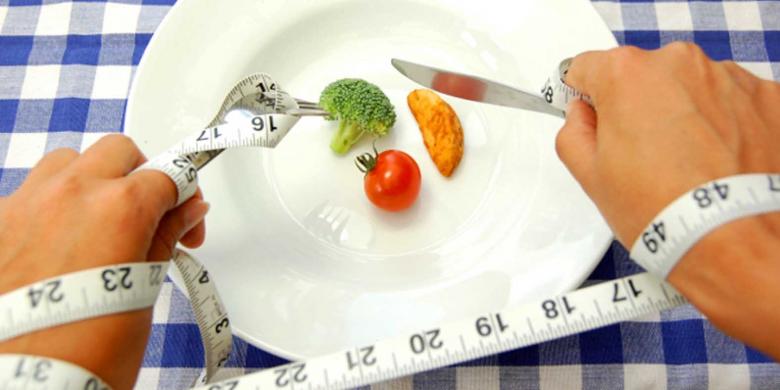High cholesterol or hypercholesterolaemia is a condition in which the level of cholesterol in the blood that goes beyond normal levels. Cholesterol itself is a waxy fatty compound that is mostly produced in the liver and some of it is obtained from food. High cholesterol conditions can increase the risk of serious illness. Diseases that lurk high cholesterol sufferers are usually associated with the presence of excessive cholesterol deposition in blood vessels, such as strokes and heart attacks.
According to the WHO report in 2011, it is estimated that about 35 percent of Indonesia's population has higher cholesterol levels than normal limits good for health. This means that one-third of Indonesia's population at high risk of artery disease.
Excess cholesterol can result from eating foods with high cholesterol content or lack of exercise. However, this condition can also occur due to hereditary factors.
About Cholesterol
Actually cholesterol is needed by the body to help build new cells so that the body can keep functioning normally. In addition, cholesterol also helps the body produce vitamin D, a number of hormones, and bile acids to digest fats.
In the blood, cholesterol is carried by proteins. Combined both are called lipoproteins. The two main types of lipoproteins are low-density lipoproteins (LDL) commonly called bad cholesterol and high-density lipoproteins (HDL) commonly called good cholesterol.
LDL is responsible for transporting cholesterol from the liver to the cells in need. But if the amount of cholesterol exceeds the need, it can settle on the walls of the arteries and cause disease. On the other hand, HDL, as opposed to LDL, is responsible for transporting cholesterol back into the liver. Inside the liver, cholesterol will be destroyed or expelled by the body through feces.
The suggested blood cholesterol levels may vary depending on whether the person has a higher or lower risk of developing arterial disease. The amount of cholesterol in the blood can be measured by doing a blood test.
You should check blood cholesterol levels if you are overweight, have high blood pressure, have diabetes, or have other diseases that can increase your cholesterol levels.
Diagnosis of cholesterol levels is also recommended if a person has a close family who suffer from cholesterol disease, or a close family who has a history of cardiovascular disease at an early age.
For those who have been diagnosed with coronary heart disease, mild stroke, or peripheral arterial disease, it is advisable to perform this examination as well.
The impact of high cholesterol
When excessive cholesterol settles on the walls of the arteries, the blood flow in the heart, brain, and other body parts can be inhibited. In other words, high cholesterol increases a person's risk of arterial constriction or atherosclerosis, blood clots in certain body parts, minor strokes, strokes, and heart attacks.
High cholesterol levels can also cause pain in the front of the chest or on the arm (angina) when a person experiences stress or heavy physical activity. In addition, high cholesterol also increases a person's risk of coronary heart disease.
If you do not change your diet and do not quit smoking, people with high cholesterol will be more at risk of stroke or heart disease. In cigarettes found a chemical called acrolein. This substance can stop the activity of good cholesterol or HDL to transport fat deposits to the liver. As a result, arterial narrowing or atherosclerosis may occur.
In addition, the risk of the patient also increases if he suffers from hypertension, diabetes, or has a family suffering from heart disease or stroke.
High cholesterol can also be caused by a genetic condition (heredity) called familial hypercholesterolaemia (FH). Cholesterol levels of patients with this condition remain high despite eating healthy foods.
How to prevent or lower cholesterol levels
Healthy lifestyle is indispensable in treating high cholesterol conditions. Eating a healthy and nutritious balanced diet is one of the main steps that can be done in preventing or lowering cholesterol levels. Fat content in foods should be low. Try changing the consumption of foods containing saturated fats with fruits and vegetables, as well as whole grains (eg whole wheat bread). That way, cholesterol levels in the body will remain low. In addition to a healthy diet, immediately start exercising regularly and lose weight for those who are overweight. No less important, avoid smoking.
If the above suggestions are still not able to lower your cholesterol levels and the risk of heart disease remain stalked, you should consult a doctor. Doctors will usually do the treatment by giving you prescription cholesterol-lowering drugs, such as statins.
Causes of High Cholesterol
Many factors can cause high cholesterol, one of which is lifestyle. Here are the things that are categorized as unhealthy lifestyles are high risk of triggering increased levels of bad cholesterol in the blood.
- The habit of eating unhealthy foods. The most influential effect on cholesterol levels in the blood is the high levels of saturated fat in these foods. Foods high in saturated fats include coconut milk, offal, cow brain, goat meat, duck meat with skin, chicken skin, shellfish, shrimp, squid, and quail eggs.
- Reluctance to exercise or lack of physical activity.
- Especially for those of you who smoke, in cigarettes found a chemical called acrolein. This substance can stop the activity of HDL or good cholesterol to transport the fat deposits from the body to the heart to be removed. As a result, arterial narrowing or atherosclerosis may occur.
- The habit of consuming too much liquor.
Another factor that makes a person more at risk of high cholesterol is obesity and has an excessive waist circumference. For those of us who belong to Asian people, obesity means having a body mass index above 25 (kg / m2) whereas it is said that the waist circumference is over 90 cm for men or 80 cm for women. If a person is obese, then he or she is likely to have bad cholesterol levels and higher triglyceride levels and lower good cholesterol levels.
Triglycerides are another type of fatty substance in the blood. There are several causes of rising triglyceride levels in a person's body, partly because of genetic factors, obesity, too much alcohol consumption, and eating too many foods containing sugar or high fat.
Other factors
In addition to lifestyle, there are some conditions that can change a person's cholesterol levels to high, among them are high blood pressure and diabetes, less active thyroid gland, liver disease, and kidney disease. Treating these underlying conditions can help lower cholesterol levels.
High cholesterol is also susceptible to certain races in the world. A person who is of Bangladeshi, Indian, Sri lanka, or Pakistani origin is more at risk of getting high cholesterol. In addition to race, age is also a deciding factor. As age increases, the risk for constriction of arteries or atherosclerosis increases.
Another factor is family or genetic history. The high cholesterol conditions that occur in the family are called familial hypercholesterolaemia. One in five hundred people inherited this condition from the parents. Someone who has this condition, usually can not eliminate excess cholesterol contained in the blood perfectly. And for those who live with high cholesterol levels, it means risky to get heart trouble early. You are more susceptible to high cholesterol if the male family (father or sibling) has a stroke or coronary heart disease under the age of 55 years. You are also prone to having high cholesterol if your female family (mother or sibling) is exposed to stroke or high blood under the age of 65 years.
Diagnosis of High Cholesterol
Blood cholesterol levels can be measured by simple blood tests. Blood samples will be used to determine the level of total cholesterol, bad cholesterol (LDL), good cholesterol (HDL), and triglycerides in the blood. Before performing the test, patients will usually be asked not to eat for 10-12 hours. The goal is that the test results are not affected by food that is still digested.
After the examination is complete and the results are obtained, the doctor will explain to the patient and conclude whether the patient has low, medium or high risk for cardiovascular disease, such as stroke or heart disease within 10 years. The conclusion is not only based on the results of cholesterol tests, but also obtained by taking into account the following points.
- Gender, family history, ethnicity, and age.
- Risk factors that can be treated, such as diabetes, high blood pressure, and other diseases.
- The body mass index of a patient whose size is obtained from the weight ratio of the patient to the height.
To measure total cholesterol, blood cholesterol is measured in units called milimol per liter of blood, or commonly abbreviated as mmol / L. For healthy adults, the recommended cholesterol level is 5 mmol / L or less. As for those at high risk, 4 mmol / L or less is recommended.
The ideal cholesterol (LDL) level is 3 mmol / L or less for healthy adults and 2 mmol / L or less for those at high risk. The ideal cholesterol level is above 1 mmol / L. If below that, then the risk of heart disease will be high.
In addition to checking cholesterol levels, triglyceride levels will also be checked. Triglycerides are fat in the body that will be converted into energy. This substance comes from the consumption of fatty foods. The unused triglycerides are stored in the fat tissue. Excess triglycerides can cause heart disease. The recommended triglyceride level is equal to / or below 1.7 mmol / L.
People who are suggested to have cholesterol tests
Someone is advised to have a blood cholesterol test if:
- Aged over forty years.
- Have diabetes or high blood pressure.
- Being overweight or obese.
- Diagnosed with mild stroke, peripheral artery disease, or coronary heart disease.
- Have other diseases, such as kidney disease, inflammation of the pancreas or pancreatitis, or underactive thyroid gland. These diseases can increase triglyceride and cholesterol levels.
- Has a close relative who has a cholesterol-related health disorder, such as familial hypercholesterolaemia.
- Has a family history of early cardiovascular disease (eg father or brother who has a stroke, heart disease, or heart attack under age 55 and mother or sister who is affected by the disease under age 65).
High Cholesterol Treatment
If the diagnosis states that you have high cholesterol, your doctor will first advise you to change your diet, not smoking, and increase the frequency of exercise. This suggestion can also be applied in everyday life although in good health to help prevent high cholesterol.
Eating a healthy diet with low saturated fat content can help lower bad cholesterol levels in the body. Try to avoid the consumption of foods containing high saturated fats, as listed below.
- Lamb
- Duck meat and skin
- Chicken skin
- Innards
- Cow's brain
- Coconut milk
- Crackers
- Cakes and biscuits
- Quail eggs
- Calamari
Overall, the average man should not consume saturated fat more than 30 grams per day. For women, saturated fat intake should not exceed 20 grams per day. How to know the levels of saturated fat you eat can be seen on the list of doses listed in the product packaging.
Most nutritionists believe that the fatty substances contained in avocados and tuna, mackerel and salmon oils are good for health. The substance is known as omega-3 fatty acids.
For people with high triglyceride levels, it is advisable to consume omega-3 fatty acids to decrease their triglyceride levels. Eating omega-3 nutrients, such as fish twice a week, is believed to be beneficial for those who have high levels of triglycerides in the blood. But do not consume excessive because of high levels of omega-3 in the body can trigger the occurrence of obesity.
Overcoming high cholesterol with drugs
If in a few months cholesterol does not go down, even if you already practice a healthy lifestyle, then the doctor can advise you to take cholesterol-lowering drugs.
There are several types of cholesterol-lowering drugs and each of these drugs works in different ways. To find out the medication that suits you, you should consult your doctor first. If you also have high blood pressure or hypertension, most likely your doctor will prescribe medication to lower it. Some cholesterol-lowering drugs that can be prescribed by doctors are statins, aspirin, and ezetimibe.
Statins are useful for lowering cholesterol levels by blocking enzymes in the liver that are responsible for producing cholesterol. If prescribed by a doctor, usually the patient will take statins for a lifetime. Because if statins are not given, then cholesterol levels can go back up and can increase the risk of other related diseases, such as heart attacks.
Some types of statin drugs that doctors can recommend are simvastatin, atorvastatin, and rosuvastatin. But there are some people who are intolerant of statins and experience side effects when taking them. Common side effects include abdominal disturbances and muscle aches.
In addition to statins, the administration of low-dose aspirin may be recommended by doctors as well. Low doses of aspirin can also prevent the formation of blood clots. Aspirin generally should not be consumed by children under the age of 16.
For people with high cholesterol who can not take statins because of side effects, are taking other drugs whose performance may be disrupted, or have a disease that can get worse if using statins, then the doctor may prescribe ezetimibe. These drugs can also be combined with statins if the use of statins alone is not enough to successfully lower cholesterol levels. Ezetimibe works by preventing the absorption of cholesterol in the intestines from food. Ezetimibe is usually not as effective as statins, but the side effects are smaller.
Patients can consume ezetimibe and statins simultaneously if their high cholesterol levels are not enough to be lowered only by statins. Side effects arising from this combination are generally the same as those that appear on the use of statins alone, namely abdominal disturbances or muscle pain.
Lowering triglyceride with medication
Niacin is usually given to those who have high triglyceride levels. Niacin is a B vitamin found in foods and multivitamin supplements. In high doses administered through the prescription, niacin is able to lower triglycerides and increase good cholesterol or HDL levels.
However, the use of high doses can also lead to side effects of skin become redness. These side effects can also be reduced by avoiding spicy food consumption.
Niacin usually will not be given to those who are experiencing abdominal pain, heartburn, digestive disorders, or those at risk of experiencing these conditions. Users of niacin will usually be advised to undergo regular blood tests to ensure their liver is functioning properly.
In addition to niacin, fibrate group medications can also be given to lower excessive triglyceride levels in the blood. It works by lowering the production of VLDL (very-low-density lipoprotein) cholesterol. This type of cholesterol mostly contains triglycerides.
In addition, as mentioned above, most nutrition experts believe that omega-3s may help to overcome high triglycerides. Apart from food, omega-3 supplementation is also available that you can get freely. Consult the use of this substance to your doctor because it may affect other drugs you are taking.
Prevention of High Cholesterol
High cholesterol levels can be lowered with healthy foods that contain balanced nutrition. Avoid or limit fatty foods because they contain cholesterol. If we eat too much fatty foods, then it can be harmful to health because the arteries can be blocked by fatty deposits. There are two types of fat, namely saturated fat and unsaturated fats.
In order for bad cholesterol levels in the blood does not increase, it is advisable to avoid foods containing saturated fat. Examples of foods that contain high saturated fats are:
- Innards
- Coconut milk
- Cow's brain
- Quail eggs
- Chicken skin and ducks
- Lamb
- Crackers
- Frying
- Calamari
- Scallops
Conversely, unsaturated fats are fats that provide good health benefits. Unsaturated fats can increase good cholesterol levels and help reduce blockages inside the arteries. Examples of foods rich in unsaturated fats are:
- Avocado
- Nuts and seeds, such as almonds and walnuts
- Olive oil
- Natural peanut butter
- Salmon, tuna, and mackerel
Eating low-fat and fiber-rich foods, such as whole-grain breads and pastas, as well as fruits and vegetables, has been shown to help lower excess cholesterol levels. Fiber, vitamins, and minerals contained in these foods are able to keep the body fit.
Prevent high cholesterol with regular exercise
Regular exercise or active daily living can help raise good cholesterol levels in the body because exercise or physical activity can stimulate the body to bring the fatty deposits into the liver to break down. In addition, exercise can also keep your heart and blood vessel condition well so that blood pressure and weight can go down. Being overweight is very harmful to health because it can cause an increase in the bad cholesterol content in the blood.
We recommend doing regular exercise to keep your cholesterol levels at a low level. The recommended quantity of exercise is 2-3 hours per week. Sports in question can be cycling, swimming, or on foot.
Stop smoking
In cigarettes found a chemical called acrolein. This substance can stop the activity of HDL (good cholesterol) to transport fat deposits into liver organ resulting in narrowing of arteries or atherosclerosis. From it can be concluded that smoking is a very big risk factor for someone to have a heart attack or stroke.














